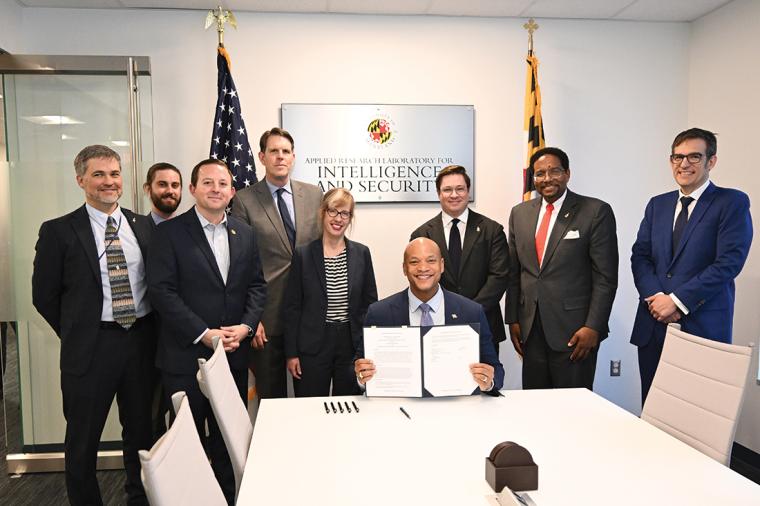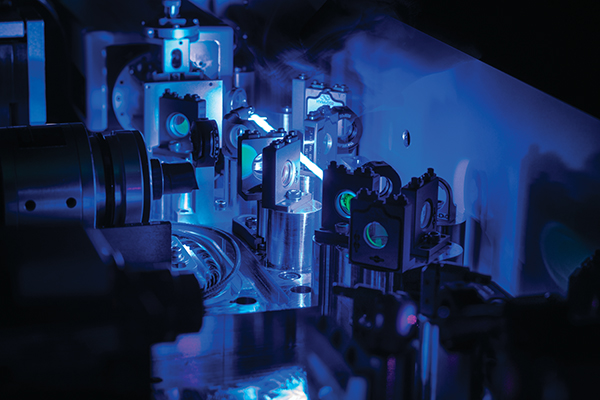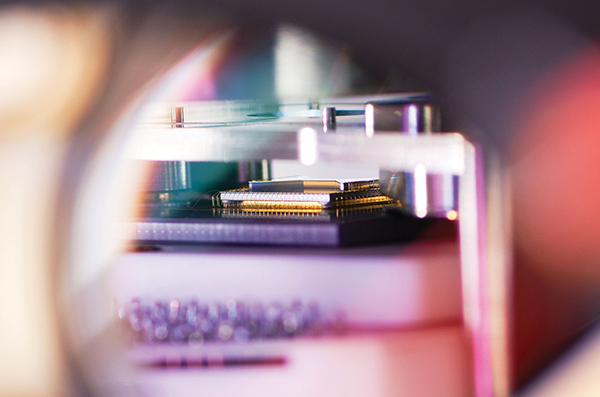
Quantum represents the next frontier of computer technology, a major leap forward with the potential to revolutionize a wide range of industries and sectors. The earliest quantum computing chips far surpass even the fastest supercomputers of today, and further advancements in computing power are expected to change the landscape in fields including cybersecurity, healthcare and drug development, communications, aerospace and more.
Maryland is poised like no other state – or no other country, for that matter – to harness the power of this quickly evolving industry.
“The University of Maryland ranks among the world’s top universities for quantum research,” said Maryland Governor Wes Moore. “The Johns Hopkins Institute for Quantum Matter is focused on exploring quantum materials and their potential uses as energy sources. We’re the proud home of IonQ – the first pure-play quantum company in history to go public. And we’re the headquarters of the Mid-Atlantic Quantum Alliance, launched in January 2020, to accelerate quantum science and engineering. We have an unparalleled cybersecurity corridor, which includes Fort Meade, U.S. Cyber Command and major defense companies. Maryland has had these assets for decades; we just needed the strategy to leverage them. And that’s what my administration has helped to deliver — our strategy is driven by a commitment to public-private partnerships that can support the development of quantum technology and harness the power of quantum discoveries.”
A New Public-Private Initiative

specialized optical systems, which redirect the photon into a fiber optic cable.
Photo provided by IonQ
Earlier this year, Governor Moore launched the Capital of Quantum Initiative, a public-private partnership with an aspirational goal of catalyzing $1 billion in investments and solidifying the state’s leadership as one of the world’s top quantum epicenters, with the University of Maryland as the key anchor. Through executive order, Governor Moore identified quantum computing, along with life sciences and aerospace, as a “lighthouse” sector in which the state plans to commit additional resources to ensure the industries reach their full potential in Maryland.
Maryland’s assets and talent are in demand for quantum development across the world.
When Governor Moore led a trade mission to Asia this spring, Maryland’s global reputation for quantum leadership was a key point of discussion, particularly at a first-of-its-kind Quantum Roundtable between the Maryland delegation, including IonQ and the Japanese government as well as industry and academic leaders.
When a Tennessee-based technology company launched its own quantum project recently, it had to look to Maryland’s experience and expertise, by partnering with IonQ, to meet its needs.
Maryland’s roots in quantum go deep: researchers at the Johns Hopkins Applied Physics Laboratory (APL) have been researching quantum science since the 1980s, and Maryland established its own quantum hub in 2021. Based at the University of Maryland, College Park, the National Quantum Laboratory at Maryland, or QLab, supports the global community with developing near-term, real-world quantum computing and networking applications and talent.
QLab is just one reason UMD is already a world-renowned quantum computing hub, home to facilities and research centers including the Joint Quantum Institute, the Quantum Technology Center, the Quantum Startup Foundry and the Mid-Atlantic Quantum Alliance.
“Every element of the legislative and executive branch in Maryland understands how unique Maryland has been in supporting quantum now for 30 years,” Niccolo de Masi, president and CEO of IonQ, told Forbes recently. “Think about what this Silicon Valley of quantum will look like: It’ll be incubation, it’ll be startups, it’ll be more researchers, it’ll be more job creation — and not just at IonQ, but at adjacent companies.”
IonQ’s new 100,000 square-foot headquarters, which is expected to include a data center, laboratories and office space, will be located in the Discovery District adjacent to the College Park campus.

This small trap features around 100 tiny electrodes precisely designed. Photo provided by IonQ
Less than an hour away, Johns Hopkins University is home to the Institute for Quantum Matter and the Hub for Imaging and Quantum Technologies, while quantum research continues at APL. The laboratory recently announced progress in accelerating the testing of qubits “the quantum equivalent of a computer bit, or basic unit of information” to study the impact of cosmic radiation on quantum systems.
“The usual method for collecting data takes days or even weeks,” said Kevin Schultz, assistant program manager of Alternative Computing Paradigms at APL, in a news release. “We can reproduce those results in a matter of minutes.”
Another significant step in Maryland’s “Capital of Quantum” initiative came with the signing of an agreement between the state and the U.S. Defense Advanced Research Projects Agency (DARPA) to establish the “Capital of Quantum Benchmarking Hub” at the University of Maryland, College Park. This hub will play a crucial role in measuring and confirming the effectiveness of quantum computing systems.
“This partnership with DARPA and the State of Maryland underscores our long-standing commitment to cutting-edge research and national security,” said University of Maryland, College Park President Darryll J. Pines. “Together, we are building the infrastructure and expertise needed to evaluate, refine and ultimately realize the promise of quantum computing.”
Maryland’s leadership in quantum development is also driven by its leadership in cybersecurity. As the home of agencies like the National Security Agency, U.S. Cyber Command and the National Institute of Standards and Technology (NIST) as well as 19 Centers of Academic Excellence and a thriving ecosystem of private companies, the state is a hub for cyber innovation and talent development.
The rise of quantum computing will require innovations in cybersecurity as well, according to Maryland Commerce Secretary Harry Coker, Jr., who previously served as National Cyber Director under President Joe Biden.
“Quantum computing systems will be more powerful than many traditional cybersecurity tools and systems; post-quantum cryptography will need to be stronger and more sophisticated,” Coker said. “Cell phones, laptops, smart devices…they’ll all need post-quantum cryptography to protect users. Maryland, with its highly skilled cyber and tech workforce, its research infrastructure and its federal and military partners, will be on the cutting-edge of developing those new tools and systems.” T&ID

